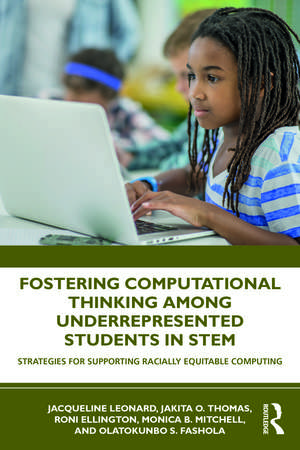Fostering Computational Thinking Among Underrepresented Students in STEM: Strategies for Supporting Racially Equitable Computing
Autor Jacqueline Leonard, Jakita Thomas, Roni Ellington, Monica Mitchell, Olatokunbo Fasholaen Limba Engleză Paperback – 12 aug 2021
Computational algorithmic thinking (CAT)—a precursor to CT—is explored in this text as the ability to design, implement, and evaluate the application of algorithms to solve a variety of problems. Drawing on observations from research studies that focused on innovative STEM programs, including underrepresented students in rural, suburban, and urban contexts, the authors reflect on project-based learning experiences, pedagogy, and evaluation that are conducive to developing advanced computational thinking, specifically among diverse student populations.
This practical text includes vignettes and visual examples to illustrate how coding, computer modeling, robotics, and drones may be used to promote CT and CAT among students in diverse classrooms.
| Toate formatele și edițiile | Preț | Express |
|---|---|---|
| Paperback (1) | 376.10 lei 43-57 zile | |
| Taylor & Francis – 12 aug 2021 | 376.10 lei 43-57 zile | |
| Hardback (1) | 1000.27 lei 43-57 zile | |
| Taylor & Francis – 12 aug 2021 | 1000.27 lei 43-57 zile |
Preț: 376.10 lei
Nou
Puncte Express: 564
Preț estimativ în valută:
71.97€ • 74.69$ • 60.16£
71.97€ • 74.69$ • 60.16£
Carte tipărită la comandă
Livrare economică 17-31 martie
Preluare comenzi: 021 569.72.76
Specificații
ISBN-13: 9780367456511
ISBN-10: 0367456516
Pagini: 226
Ilustrații: 66
Dimensiuni: 152 x 229 x 12 mm
Greutate: 0.45 kg
Ediția:1
Editura: Taylor & Francis
Colecția Routledge
Locul publicării:Oxford, United Kingdom
ISBN-10: 0367456516
Pagini: 226
Ilustrații: 66
Dimensiuni: 152 x 229 x 12 mm
Greutate: 0.45 kg
Ediția:1
Editura: Taylor & Francis
Colecția Routledge
Locul publicării:Oxford, United Kingdom
Public țintă
Postgraduate, Professional, and Undergraduate AdvancedCuprins
- The Advent of Computational Thinking
- Designing Learning Environments that Support Developing Computational Algorithmic Thinking Capabilities
- Coding, Game Design, and Computational Thinking
- Using Computer Modeling and Drones to Develop Computational Thinking Among Predominantly Black Student
- Facilitating Computational Participation, Place-Based Education, and Culturally Specific Pedagogy with Indigenous Students
- Professional Development that Fosters Computation Thinking and High-Quality Teaching for Students of Color
- Program Evaluation of Broadening STEM Participation for Underrepresented Students of Color
Notă biografică
Jacqueline Leonard is Professor of Mathematics Education in the School of Education at the University of Wyoming, USA.
Jakita O. Thomas is the Philpott Westpoint Stevens Associate Professor of Computer Science and Software Engineering at Auburn University, USA.
Roni Ellington is Associate Professor of Mathematics Education in the Department of Advanced Studies Leadership and Policy at Morgan State University, USA.
Monica B. Mitchell is founder and President of MERAssociates, LLC (MERA), an award-winning evaluation consultancy based in the greater metropolitan area of Washington, D.C., USA.
Olatokunbo S. Fashola is Research Professor and the Faculty Coordinator for the Dual Enrollment Program in the School of Education at American University in Washington, D.C., USA.
Jakita O. Thomas is the Philpott Westpoint Stevens Associate Professor of Computer Science and Software Engineering at Auburn University, USA.
Roni Ellington is Associate Professor of Mathematics Education in the Department of Advanced Studies Leadership and Policy at Morgan State University, USA.
Monica B. Mitchell is founder and President of MERAssociates, LLC (MERA), an award-winning evaluation consultancy based in the greater metropolitan area of Washington, D.C., USA.
Olatokunbo S. Fashola is Research Professor and the Faculty Coordinator for the Dual Enrollment Program in the School of Education at American University in Washington, D.C., USA.
Descriere
This book broadly educates preservice teachers and scholars about current research on computational thinking (CT). More specifically, attention is given to computational algorithmic thinking (CAT), particularly among underrepresented K–12 student groups in STEM education.
